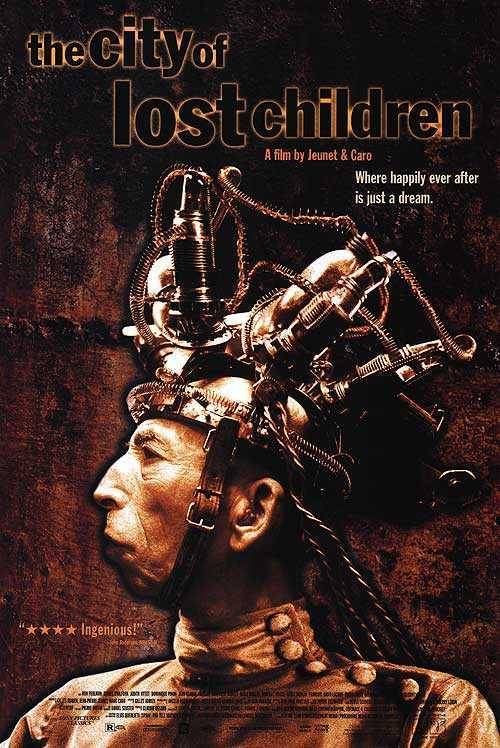#Jean Claude Dreyfus
Text
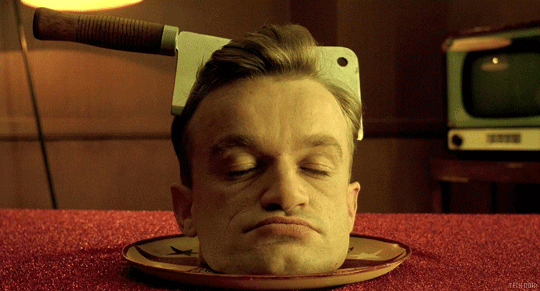
.
Nobody is entirely evil: it's that circumstances that make them evil, or they don't know they are doing evil.
Delicatessen, Marc Caro and Jean-Pierre Jeunet (1991)
#Marc Caro#Jean Pierre Jeunet#Gilles Adrien#Dominique Pinon#Marie Laure Dougnac#Jean Claude Dreyfus#Karin Viard#Ticky Holgado#Anne Marie Pisani#Edith Ker#Rufus#Jacques Mathou#Howard Vernon#Darius Khondji#Carlos D'Alessio#Hervé Schneid#1991
9 notes
·
View notes
Text
youtube
O irmão mais velho de O sobrevivente (1987) e pai de Jogos Vorazes: "O preço do perigo" (1983)
#Le Prix du Danger#1983#80's movies#Yves Boisset#Robert Sheckley#The Prize of Peril#Michel Piccoli#Gérard Lanvin#Gerard Lanvin#Marie France Pisier#Bruno Cremer#Andréa Ferreol#Andrea Ferreol#Jean Rougerie#Henri Jacques Huet#Jean Claude Dreyfus#french movie#Jean Pierre Bagot#Gabrielle Lazure#Catherine Lachens#Steve Kalfa#Youtube
1 note
·
View note
Text

Jean-Claude Dreyfus by Denis Rouvre
4 notes
·
View notes
Photo
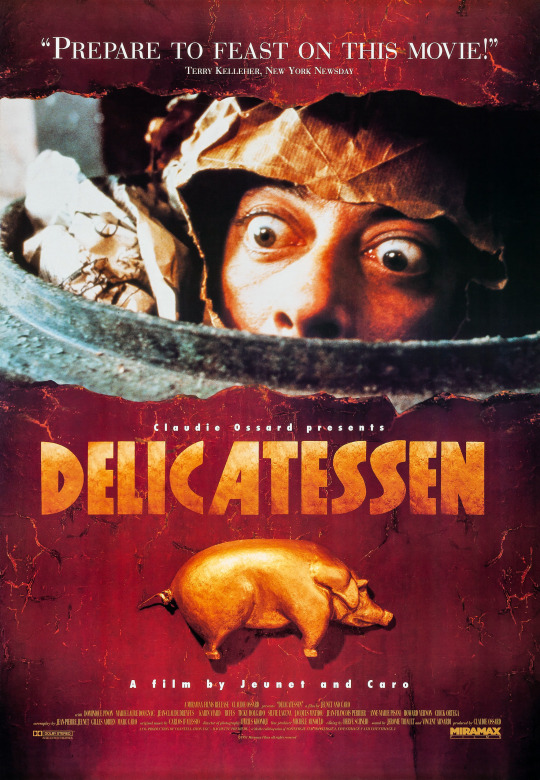
#delicatessen#dominique pinon#marie-laure dougnac#jean-claude dreyfus#karin viard#rufus#ticky holgado#Sylvie Laguna#jacques mathou#jean-francois perrier#anne-marie pisani#howard vernon#chick ortega#marc caro#jean-pierre jeunet#1991
24 notes
·
View notes
Text
The City of Lost Children (1995)
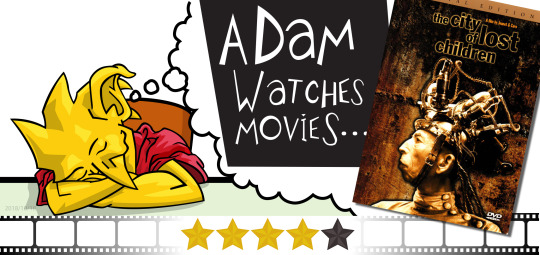
The City of Lost Children is a film with a distinct style of storytelling and equally unique visuals. It stands out among the rest. Although not every idea is fully developed, it's unforgettable.
Long ago, a scientist created Krank (Daniel Emilfork), an intelligent but evil man who cannot dream. Living on an abandoned oil rig with the long-gone scientist’s other creations, a dwarf named Martha (Mireille Mossé), six childish clones (Dominique Pinon) and a brain in a vat named Irvin (voiced by Jean-Louis Trintignant), Krank has strongarmed them into stealing children for him. From the children, he hopes to find a way to dream. After Krank’s minions kidnap Denree (Joseph Lucien), his older brother One (Ron Pearlman) teams up with a street urchin named Miette (Judith Vittet) to find the lost children.
The plot sounds awfully random but there's a logic woven through. It's just difficult to put into words. Part fairytale, part futuristic nightmare, The City of Lost Children is filled with characters so unique they pop off the screen. Miette is part of a gang of orphans working for the Octopus, a pair of conjoined twins (played by Geneviève Brunet and Odile Mallet) who share more than just a body. Their movements mimic, or complement each others’ in a way that suggests they share a mind too. The ones responsible for the kidnapping are members of the Cyclops Cult, whose followers ritually blind themselves and use cybernetic eyes to see. On their own, they’d stand out but in a tale where we frequently get to walk through children’s dreams and every character feels like it’s from a cross between Oliver Twist and Snow White with a side trip through Alice in Wonderland, you only question them once the end credits have finished and you’ve returned to the real world.
It’s hard to pick just one aspect of this surreal tale as “the best" but I’ve decided to settle upon the dreams we see Krank wander through. Through relatively simple special effects, The City of Lost Children gets the feel of them perfectly. The bizarre in-the-moment logic, the fleeting imagery, the simple but chilling turns that make you wake up unsettled from a nightmare are all there. So often, I see films try to show dreams and drop the ball. This French production (yes, you’ll need to turn on the subtitles) gets it right.
A few aspects of this picture by Marc Caro and Jean-Pierre Jeunet don’t quite work. The Cyclopses, for example, fit in this world but aren’t necessary and dropping them might’ve given us time to examine the key characters further. It’s also worth noting that a few special effects are dated (mostly close-up shots of CG insects). Aside from those criticisms, this is a bit of a demented masterpiece. I love how it interprets the theme of childhood innocence. The adults have either retained it, or seek it, while the kids have given up on it long ago. Some images shown are so vivid they cannot be forgotten once seen. This overshadows the difficulty you might have wrapping your mind around all the ideas the film presents.
After finishing The City of Lost Children, I immediately wanted to watch it again. It’s not that the story is life-altering, that the performances are that good, or that it all necessarily means something big. It’s that this work is so distinct one taste makes you crave more. The picture’s a tad overindulgent in the weirdness, but somehow, that also works in its favour. (Original French version on DVD, May 11, 2018)

#The City of Lost Children#movies#films#movie reviews#film reviews#Marc Caro#Jean-Pierre Jeunet#Gilles Adrien#Ron Perlman#Daniel Emilfork#Judith Vittet#Dominique Pinon#Jean-Claude Dreyfus#1995 movies#1995 films
3 notes
·
View notes
Text
by NORMAN J.W. GODA
All of this made perfect sense to French Trotskyists and Maoists. Pro-Palestinian anti-Zionist organizations formed in France after the Six-Day War. They included university students who styled themselves as revolutionaries. Using the language of anti-colonialism still fresh from France’s ill-fated attempt to retain Algeria, these organizations also borrowed the legacy of the French Resistance, neatly turning the Israelis into the Nazis. French keffiyeh-wearing Communists complained of Jewish press control. “Palestine solidarity” events included distribution of the Protocols of the Elders of Zion. As Jewish writer Gérard Rosenthal put it in early 1970, “The problem of Israel is becoming a national problem.” Israel’s seasoned ambassador Asher Ben-Natan, who arrived in Paris in 1970, noted that relations with France had hit difficulties because “there exists also in France elements that have suddenly adopted anti-Israel attitudes.”
How did France’s Jews respond? By asserting their Jewishness without sacrificing their claim to France’s promise of universal dignity. “The world,” said Meïr Waintrater, the editor of the Jewish monthly L’Arche, in April 1970, “only likes dead Jews. . . . It is impossible today to open a newspaper without finding an article [that] gives Jews advice — which curiously resembles orders — on how to be Jewish or how to be French.” Later, in 1977, filmmaker Claude Lanzmann asked, “Why must the Jews feel obligated after Auschwitz to speak in [polite] language? To prove that they are really French? This language . . . is from the time of Dreyfus! It is the language [from] before the creation of Israel! If we are to protest, I ask that we do so as Jews!”
The chief vehicle of the French-Jewish campaign was the International League against Racism and Antisemitism (LICRA), formed in 1927 in reaction to the dreadful treatment of Jews in Eastern Europe after World War I. After World War II, LICRA countered racism as well, monitoring everything from apartheid in South Africa to the civil rights movement in the United States to the war in Vietnam to the treatment of Arab workers in France. For French Jews, anti-antisemitism and the fight against racism were both part of the struggle for human dignity. LICRA saw no contradiction between opposing racism and advocating the safety of the State of Israel. If the world was divided, it was not between the oppressors and the oppressed. It was divided into those whose rights to safety were respected and those whose rights were not.
LICRA altered its view on de Gaulle. He was still the man who, on June 18, 1940, had called for resistance to the Germans in the name of the universalism France represented. As LICRA president and former Gaullist intelligence officer Jean Pierre-Bloch put it, “We will never forget.” But Pierre-Bloch also noted publicly that de Gaulle “is betraying the Franco-Israeli friendship, not to [help] the Arab people, but to support the potentates who rule these people to their great detriment.” Understanding that the French policy encouraged Arab extremists to hold out for Israel’s destruction rather than work for peace, LICRA also led demonstrations of Jews and non-Jews in Paris and other cities against what Pierre-Bloch called “the scandalous embargo.” Meanwhile LICRA called for a Palestinian state — but without the PLO, whose terror operations disqualified it from any human-rights struggle.
LICRA’s writers, Jews and non-Jews, also tried to expose the antisemitic nature of anti-Zionism in their newspaper Le Droit de vivre. Didier Aubourg, who worked for Judeo-Christian amity in France, wrote in March 1970, “Of all the forces that threaten Israel, the Arab armies are far from the most fearsome. The most relentless enemy . . . is indeed antisemitism, the old antisemitism that no longer dares to say its name, but which, rebaptized as anti-Zionism, has never lost its murderous virulence.” Former member of the Resistance, writer, and curator Jean Cassou was more direct. Anti-Zionism, he said, was “a wonderful invention,” because it “allows everyone to be an antisemite in good conscience from now on.”
As for the PLO’s mask of humanism and progressivism, philosopher Anne Matalon noted in the spring of 1968 that “one would be justified in thinking” that the PLO “would recognize . . . the Israeli people.” Instead, the PLO resembled “a capricious child or psychopath” who insisted that history could be turned back. Could the PLO really pose as revolutionary? Jacques Givet, whose family was murdered in Auschwitz and who narrowly escaped death by jumping from a deportation train, said no. “Any apology for al-Fatah, however veiled,” he wrote in March 1969, referring to the PLO’s main group, “is by necessity an apology for genocide.” Unlike the anti-colonial terror in Algiers, Givet argued, “Free Palestine” was little more than a slogan wrapped in pseudo-revolutionary imagery to justify Israel’s destruction and the killing of Jews. François Musard, a member of the Jewish Resistance, identified Palestinian terror as “defiance of the most elementary rules of civilization.” It “strikes blindly in theaters, in markets, among innocent populations where their victims are more often women and children. It wants nothing more than ‘to kill a Jew.’”
20 notes
·
View notes
Text
people who signed the letter in support of depardieu (an abuser):

Benoit Poelvoorde (actor), Nathalie Baye (actress), Carole Bouquet (actress), Jacques Dutronc (singer), Charlotte Rampling (actress), Yvan Attal (actor and director), Jacques Weber (actor), Bertrand Blier (director ), Emmanuelle Seigner (actress), Roberto Alagna (singer), Michel Fau (actor and director), Victoria Abril (actress), Dominique Besnehard (actor and producer) Carla Bruni (singer), Pierre Richard (actor), Clémentine Célarié (actress), Gérard Darmon (Actor), Rudy Ricciotti (architect), Christophe Barratier (director), Arielle Dombasle (singer), Francis Veber (director), Patrice Leconte (director), Brigitte Fossey (actress), Boualem Sansal ( writer), Charles Berling (actor), Yannis Ezziadi (actor and author) Philippe Caubère (actor), Vincent Perez (actor), Myriam Boyer (actress), Antoine Dulery (actor), Afida Turner (singer), Paolo Branco (producer ), Jean-Marie Rouart, of the French Academy (writer), Josée Dayan (director), Joel Seria (director), Bernard Murat (director), Serge Toubiana (film critic and former director of the Cinémathèque française) , Catherine Millet (writer), Jacques Henric (writer), Stéphanie Murat (director), Marie-France Brière (producer and director), Daniel Humair (musician and painter), Judith Magre (actress), David Bélugou (theater decorator) , Marie Beltrami (stylist), Tanya Lopert (actress), Jean-Claude Dreyfus (actor), Chiara Muti (actress), Jean-Marie Besset (playwright), Stéphane Druet (director), Christine Boisson (actress), Karine Silla-Perez (actress and director), Myriam Boisaubert (poet), Lilian Euzéby (painter), Marion Lahmer (actress).
Nadine Trintignant announced this December 29 in “Le Point” that she was withdrawig her signature from the platform.
"Hi ! About Depardieu and the letter: yes, a lot of people such as Nadine Tratignant and Carole Bouquet withdrawed their signature. Not because supporting the victims but because the author of the letter is far right (in french "d'extrême droite) and national journal say it. They still support Depardieu. For example, Carole Bouquet was a great supporter of Depardieu few days ago in a lot of radio/tv show."
2 notes
·
View notes
Text

Klaus Kinski in Fitzcarraldo (Werner Herzog, 1982)
Cast: Klaus Kinski, Claudia Cardinale, José Lewgoy, Miguel Ángel Fuentes, Paul Hittscher, Huerequeque Enrique Bohorquez, Grande Otelo. Peter Berling, David Pérez Espinosa, Milton Nascimento, Costante Moret, Jean-Claude Dreyfus. Screenplay: Werner Herzog. Cinematography: Thomas Mauch. Production design: Ulrich Bergfelder, Henning von Gierke. Film editing: Beate Mainka-Jellinghaus.
Why does Werner Herzog's infamously extravagant Fitzcarraldo begin with Fitzgerald/Fitzcarraldo (Klaus Kinski) and his brothel-owner mistress Molly (Claudia Cardinale) attending a performance of Verdi's Ernani that stars not only Enrico Caruso but also, in the role of Elvira, Sarah Bernhardt (played by a man in drag), who mimes while a soprano sings from the pit? Probably to add several more layers of myth to the story, since there is some doubt that Caruso ever sang at the Teatro Amazonas in Manaus and he almost certainly never appeared in a production of Ernani with a lip-synching Bernhardt. If Fitzcarraldo is about anything, it's about obsessions, the more extravagant and, yes, operatic the better. Which is why Herzog's own obsession with actually hauling a steamship over a hill through the jungle, instead of using special effects, models, and montage, is so ironic. If we can believe that Klaus Kinski is an Irishman, we can believe almost anything. Why resort to reality? Fitzcarraldo is also about the power of illusions, of misguided and conflicting belief systems. Fitzgerald believes, against all evidence to the contrary, in himself. The Indians who labor for him do so because they believe he is some kind of god. So it's entirely appropriate that the central metaphor for a film about extravagantly obsessive belief in illusions should be opera, that most extravagant and illusion-filled of artistic media. (If, that is, you exclude movies.) Is Fitzcarraldo a great film? As fascinating as Kinski's eye-popping is to watch, he never transcends his persona as an actor to create a credible character. And I don't understand what Fitzgerald hopes to achieve by hauling the ship across the isthmus to the rubber plantation. Wouldn't he have to haul it back over again, this time with cargo, to benefit? But such considerations tend to fall by the wayside when viewers encounter the audacity of what's on the screen, and even more so when they learn the behind-the-scenes story of the making of the film. Fitzcarraldo falls into that category of cinematic overreaching occupied by movies like Apocalypse Now (Francis Ford Coppola, 1979) and Heaven's Gate (Michael Cimino, 1980). If it isn't a great movie, it's certainly a unique one. And maybe we should be thankful for that.
5 notes
·
View notes
Text
Events 2.7
457 – Leo I becomes the Eastern Roman emperor.
987 – Bardas Phokas the Younger and Bardas Skleros, Byzantine generals of the military elite, begin a wide-scale rebellion against Emperor Basil II.
1301 – Edward of Caernarvon (later king Edward II of England) becomes the first English Prince of Wales.
1313 – King Thihathu founds the Pinya Kingdom as the de jure successor state of the Pagan Kingdom.
1365 – Albert III of Mecklenburg (King Albert of Sweden) grants city rights to Ulvila (Swedish: Ulvsby).
1497 – In Florence, Italy, supporters of Girolamo Savonarola burn cosmetics, art, and books, in a "Bonfire of the vanities".
1756 – Guaraní War: The leader of the Guaraní rebels, Sepé Tiaraju, is killed in a skirmish with Spanish and Portuguese troops.
1783 – American Revolutionary War: French and Spanish forces lift the Great Siege of Gibraltar.
1795 – The 11th Amendment to the United States Constitution is ratified.
1807 – Napoleonic Wars: Napoleon finds Bennigsen's Russian forces taking a stand at Eylau. After bitter fighting, the French take the town, but the Russians resume the battle the next day.
1812 – The strongest in a series of earthquakes strikes New Madrid, Missouri.
1813 – In the action of 7 February 1813 near the Îles de Los, the frigates Aréthuse and Amelia batter each other, but neither can gain the upper hand.
1819 – Sir Thomas Stamford Raffles leaves Singapore after just taking it over, leaving it in the hands of William Farquhar.
1842 – Battle of Debre Tabor: Ras Ali Alula, Regent of the Emperor of Ethiopia defeats warlord Wube Haile Maryam of Semien.
1854 – A law is approved to found the Swiss Federal Institute of Technology. Lectures started October 16, 1855.
1863 – HMS Orpheus sinks off the coast of Auckland, New Zealand, killing 189.
1894 – The Cripple Creek miner's strike, led by the Western Federation of Miners, begins in Cripple Creek, Colorado, United States.
1898 – Dreyfus affair: Émile Zola is brought to trial for libel for publishing J'Accuse…!
1900 – Second Boer War: British troops fail in their third attempt to lift the Siege of Ladysmith.
1900 – A Chinese immigrant in San Francisco falls ill to bubonic plague in the first plague epidemic in the continental United States.
1904 – A fire begins in Baltimore, Maryland;[12] it destroys over 1,500 buildings in 30 hours.
1940 – The second full-length animated Walt Disney film, Pinocchio, premieres.
1943 – World War II: Imperial Japanese Navy forces complete the evacuation of Imperial Japanese Army troops from Guadalcanal during Operation Ke, ending Japanese attempts to retake the island from Allied forces in the Guadalcanal Campaign.
1944 – World War II: In Anzio, Italy, German forces launch a counteroffensive during the Allied Operation Shingle.
1951 – Korean War: More than 700 suspected communist sympathizers are massacred by South Korean forces.
1962 – The United States bans all Cuban imports and exports.
1974 – Grenada gains independence from the United Kingdom.
1979 – Pluto moves inside Neptune's orbit for the first time since either was discovered.
1984 – Space Shuttle program: STS-41-B Mission: Astronauts Bruce McCandless II and Robert L. Stewart make the first untethered space walk using the Manned Maneuvering Unit (MMU).
1986 – Twenty-eight years of one-family rule end in Haiti, when President Jean-Claude Duvalier flees the Caribbean nation.
1990 – Dissolution of the Soviet Union: The Central Committee of the Soviet Communist Party agrees to give up its monopoly on power.
1991 – Haiti's first democratically elected president, Jean-Bertrand Aristide, is sworn in.
1991 – The Troubles: The Provisional IRA launches a mortar attack on 10 Downing Street in London, the headquarters of the British government.
1992 – The Maastricht Treaty is signed, leading to the creation of the European Union.
1995 – Ramzi Yousef, the mastermind of the 1993 World Trade Center bombing, is arrested in Islamabad, Pakistan.
1999 – Crown Prince Abdullah becomes the King of Jordan on the death of his father, King Hussein.
2001 – Space Shuttle program: Space Shuttle Atlantis is launched on mission STS-98, carrying the Destiny laboratory module to the International Space Station.
2009 – Bushfires in Victoria leave 173 dead in the worst natural disaster in Australia's history.
2012 – President Mohamed Nasheed of the Republic of Maldives resigns, after 23 days of anti-governmental protests calling for the release of the Chief Judge unlawfully arrested by the military.
2013 – The U.S. state of Mississippi officially certifies the Thirteenth Amendment, becoming the last state to approve the abolition of slavery. The Thirteenth Amendment was formally ratified by Mississippi in 1995.
2014 – Scientists announce that the Happisburgh footprints in Norfolk, England, date back to more than 800,000 years ago, making them the oldest known hominid footprints outside Africa.
2016 – North Korea launches Kwangmyŏngsŏng-4 into outer space violating multiple UN treaties and prompting condemnation from around the world.
2021 – The 2021 Uttarakhand flood begins.
1 note
·
View note
Link
0 notes
Note
random af but I saw your tag on the Spirit post and oh my fucking god I thought I was like the only person ever who has seen that tiger movie!
OMG it literally broke me i cried all the different ways to cry all the way through from beginning to fucking end, seriously
THIS. OMFGGGGG 😭😭😭😭
0 notes
Text
Octobre MMXXII
Films
Les Acteurs (1999) de Bertrand Blier avec André Dussollier, Jacques François, Sami Frey, Jean-Pierre Marielle, Michel Piccoli, Claude Rich et Josiane Balasko
Histoire vraie (1973) de Claude Santelli avec Pierre Mondy, Marie-Christine Barrault, Denise Gence, Claude Brosset, Isabelle Huppert et Danielle Chinsky
Le Passager de la pluie (1970) de René Clément avec Marlène Jobert, Charles Bronson, Annie Cordy, Jill Ireland, Ellen Bahl et Steve Eckhardt
Les hommes préfèrent les blondes (Gentlemen Prefer Blondes) (1953) de Howard Hawks avec Jane Russell, Marilyn Monroe, Charles Coburn, Tommy Noonan et Elliott Reid
De l'or en barres (The Lavender Hill Mob) (1951) de Charles Crichton avec Alec Guinness, Stanley Holloway, Sydney James, Alfie Bass, Marjorie Fielding et Audrey Hepburn
La Gueule de l'autre (1979) de Pierre Tchernia avec Michel Serrault, Andréa Parisy, Jean Poiret, Bernadette Lafont, Curd Jügen, Roger Carel et Georges Géret
Invasion of the Body Snatchers (1956) de Don Siegel avec Kevin McCarthy, Dana Wynter, King Donovan, Carolyn Jones et Larry Gates
Simone, le voyage du siècle (2022) d'Olivier Dahan avec Elsa Zylberstein, Rebecca Marder, Élodie Bouchez, Judith Chemla, Olivier Gourmet, Mathieu Spinosi et Sylvie Testud
Adieu l'ami (1968) de Jean Herman avec Alain Delon, Charles Bronson, Olga Georges-Picot, Brigitte Fossey, Bernard Fresson et Jean-Claude Balard
Itinéraire d'un enfant gâté (1988) de Claude Lelouch avec Jean-Paul Belmondo, Richard Anconina, Marie-Sophie L., Jean-Philippe Chatrier, Lio, Daniel Gélin et Béatrice Agenin
Joyeuses Pâques (1984) de Georges Lautner avec Jean-Paul Belmondo, Sophie Marceau, Marie Laforêt, Rosy Varte et Michel Beaune
À bout portant (The Killers) (1964) de Don Siegel avec Lee Marvin, Angie Dickinson, John Cassavetes, Clu Gulager, Claude Akins, Norman Fell et Ronald Reagan
Détective Conan : Le Gratte-Ciel infernal (Meitantei Konan: Tokei shikake no matenrō) (1997) de Kenji Kodama avec Claudine Grémy, Philippe Valmont, Nayeli Forest, Gérard Malabat et Cyrille Monge
Les Guignols de l'info : La Fiction (1999) de Bruno Le Jean avec Yves Lecoq, Daniel Herzog, Sandrine Alexi, Nicolas Canteloup, Joël Demarty et François Jerosme
Les Trois Jours du Condor (Three Days of the Condor) (1975) de Sydney Pollack avec Robert Redford, Faye Dunaway, Cliff Robertson, Max von Sydow, John Houseman et Addison Powell
Le Bruit des glaçons (2010) de Bertrand Blier avec Jean Dujardin, Albert Dupontel, Anne Alvaro, Myriam Boyer, Christa Theret et Audrey Dana
Burn After Reading (2008) de Joel et Ethan Coen avec George Clooney, Frances McDormand, Brad Pitt, John Malkovich, Tilda Swinton et Richard Jenkins
Antoinette dans les Cévennes (2020) de Caroline Vignal avec Laure Calamy, Benjamin Lavernhe, Olivia Côte, Louise Vidal, Marc Fraize, Jean-Pierre Martins et Lucia Sanchez
La Soif du mal (Touch of Evil) (1998) d'Orson Welles avec Charlton Heston, Janet Leigh, Orson Welles, Akim Tamiroff, Joseph Calleia et Marlene Dietrich
Cinema Paradiso (Nuovo Cinema Paradiso) (1988) de Giuseppe Tornatore avec Philippe Noiret, Salvatore Cascio, Marco Leonardi, Jacques Perrin et Leopoldo Trieste
Séries
Doctor Who Series 13
Survivants du flux - Les conquérants - The Power Of The Doctor
Le Coffre à Catch
#84 : Chavo et CM Punk c'est la bagarre!! - #85 : Kelly Kelly fait du bon catch : Info ou Intox? - #86 : Le Nature Boy de passage à la ECW ! - #87 : Le meilleur Triple Threat de la ECW ?
Affaires sensibles
Qui a peur de Belphégor ? - 1984, George Orwell - Épisode 1/2 : L'affaire Dreyfus : au fond de la corbeille - Épisode 2/2 : L'affaire Dreyfus : l'innocent le plus célèbre de France - Farewell : l'espion qui a fait basculer la guerre froide - L'OVNI de Roswell et le mystère de la Zone 51 - L'Exorciste de William Friedkin, Belzébuth superstar - Le fantôme du château de Veauce
Graffiti 80
Le premier salon du changement (1981-1983) - Coulez le Rainbow Warrior (1984-1985) - Touche pas à mon poste (1986-1987) - A l'Est du nouveau (1988-1989)
Rex, Chien Flic Saison 5, 6, 7, 8
Le testament - Secrets fatals - Sissi - Série noire - Le secret des cartes - Le brésilien - Le faux coupable - Le cheval qui valait des millions - Plein gaz - Clichés tragiques - Héritage empoisonné - Mauvaises actions - À la dernière seconde - On n'embrasse pas les policiers - Et la mort frappa deux fois - Le petit chien - Hold-up - Œil pour œil - Les cachets
Dark Side of The Ring Saison 3
Le Procès des stéroïdes
Brooklyn Nine Nine Saison 1, 2, 3, 4, 5
Halloween - Halloween II - Halloween III - Halloween IV - Halloween V
Spectacles
L'Exoconférence (2014) d'Alexandre Astier
Livres
Des rives humaines de Delphine Evano
Bilbo le Hobbit de J.R.R. Tolkien
(III) et tes soupirs entre les draps de Celle qui aimait
Kaamelott Tome 8 : L'antre du Basilic de Alexandre Astier et Steven Dupré
Détective Conan : Tome 2 de Gôshô Aoyama
Marvel, les années 2000 : Tome 3 : Black Widow de Scott Hampton et Devin Grayson
Contes et légendes mythologiques de Emile Genest
Hitchcock présente : Histoires angoissantes
1 note
·
View note
Video
Jean Claude Dreyfus à l'Eden avec Philippe et Claire Ordioni, Rodia Bayginot pour BarOcus Dreyfus https://youtu.be/n-riy7PyGWc
0 notes
Text
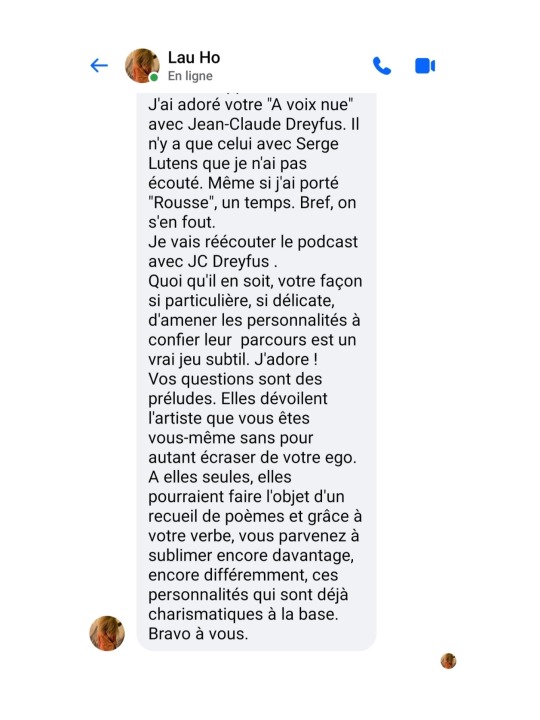
Reçu ce jour... Un compliment pareil, c'est le prélude à une jolie fin d'après-midi ! D'autant qu'il est très joliment écrit votre beau compliment... Touché.
"Tout en faisant oublier adroitement Nicolas, pour dissiper la méfiance dans cette âme naïve, Catherine y distillait superfinement l’ambroisie des compliments." — (Honoré de Balzac, Les Paysans, 1845, première partie, chapitre onzième)
0 notes

